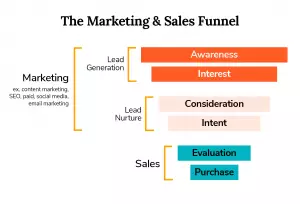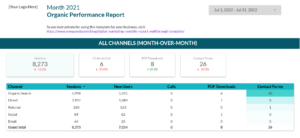Resources

What Is Full-Funnel Marketing?
The sales and marketing funnel is a visual representation of your customer lifecycle: from awareness and interest to evaluation and purchase. Full-funnel marketing is developing different marketing touchpoints to support every client interaction through each stage of the funnel by offering unique content for the top, middle and lower parts of the funnel. Because the…

Your Monthly Digital Marketing Report Format: Template and Walkthrough
Each month a gift arrives in your inbox. Your monthly digital marketing report! Regardless of what agency you work with, hopefully they’re providing you with reports. Digital marketing reports help businesses understand where traffic is coming from, where it’s headed and why it all matters. Oneupweb’s full monthly reports are endlessly customizable. Depending on the…

What Is Website Bounce Rate?
Everything You Need to Know About Bounce Rate A bounce is what happens when a user leaves your website after visiting only one page. Bounce rate is the percentage of sessions that result in a bounce. Generally, you want to aim for a low bounce rate because it means people are landing on your website…
7 Google Analytics Metrics to Track Every Month
If you’re just beginning to explore your new Google Analytics account, the dashboard can feel confusing and even overwhelming. Do you feel like you need Google Analytics help right off the bat? A good way to start your journey with Analytics is to take a free Analytics Academy course. Google Analytics for Beginners will help…

Local SEO for Franchises
The first thing to know about local SEO for franchises is that it’s not hard, but it can be time-consuming. The second thing to know is that before investing in local SEO (whether through your own time or by hiring someone), you should take stock of how you and your competitors currently appear in local…
Implementing AMP on the Oneupweb Blog: A Case Study
Introduction What Is AMP and How Is it Improving Website Performance Today? When it comes to websites, fast is better. Google has repeatedly said page speed is a ranking factor (affects search engine placement) – but it matters just as much for the user. Research shows that 32 percent of users bounce if a page…

Digital Marketing for Medical Professionals – 3 Tips to Get Started
It’s a recent trend that medical professionals and healthcare practices feel the need to embrace digital marketing. Word-of-mouth referrals from patients you’ve known your whole life no longer cut it when healthcare consumers not only find you on Google My Business but also go to review sites like Healthgrades and Yelp to shop for hospitals,…

Key Takeaways from SMX Advanced 2019
Last month, two Oneupweb employees traveled across the country to attend SMX Advanced 2019 in Seattle, a premier search marketing conference that we were fortunate enough to have attended last year, too. At this momentous meeting of marketing minds (holy alliteration!), keynote speakers from marketing and tech giants like Google, Microsoft, Search Engine Land, and…

Is Infinite Scroll or Pagination Better for Your Website Archive?
You make thousands of decisions when you create a new website. From web hosting to CMS to color scheme, you want to make choices that will make your website user-friendly and optimized to rank in organic search results. When considering how your content will load on archive pages – such as your blog home –…

Beyond the Minute: 7 SEO Myths Debunked
Search engine optimization is something we as digital marketers use every day. These are some of the most common myths surrounding our business. The benefits of SEO shouldn’t be disputed any longer, so let’s lay these myths to rest: 1. Myth: SEO doesn’t work. Truth: Simply put, yes, it does. Search engine optimization delivers organic…

Applying Personalized Medicine to Healthcare Content Marketing
How should the healthcare marketing industry approach content marketing? How about starting with a simile: Content marketing is like personalized medicine. Allow us to explain. Personalized medicine (PMx), or medical care personalized for an individual patient, grew out of the work in human DNA identification completed by the Human Genome Project in 2003. The genome-specific…

The Tools for Successful Web Page Optimization: Beyond the Minute
There’s science behind the SERP. Results brought to the top of a Google search are there after careful web page optimization. It’s a little keyword research, a sprinkle of image attributes and a dash of coding that makes up the secret formula for a well-optimized page. Lucky for you, this blog has all the web…









